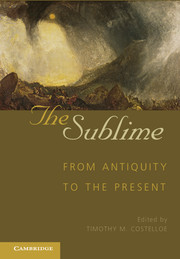Book contents
- Frontmatter
- Contents
- List of Illustrations
- Contributors
- Acknowledgments
- The Sublime
- Part One Philosophical History of the Sublime
- 1 Longinus and the Ancient Sublime
- 2 … And the Beautiful?
- 3 The Moral Source of the Kantian Sublime
- 4 Imagination and Internal Sense
- 5 The Associative Sublime
- 6 The “Prehistory” of the Sublime in Early Modern France
- 7 The German Sublime After Kant
- 8 The Postmodern Sublime
- Part Two Disciplinary and other Perspectives
- 10 The First American Sublime
- 11 The Environmental Sublime
- 12 Religion and the Sublime
- 13 The British Romantic Sublime
- 14 The Sublime and the Fine Arts
- 15 Architecture and the Sublime
- Bibliography
- Index
- References
8 - The Postmodern Sublime
Presentation and Its Limits
Published online by Cambridge University Press: 05 January 2015
- Frontmatter
- Contents
- List of Illustrations
- Contributors
- Acknowledgments
- The Sublime
- Part One Philosophical History of the Sublime
- 1 Longinus and the Ancient Sublime
- 2 … And the Beautiful?
- 3 The Moral Source of the Kantian Sublime
- 4 Imagination and Internal Sense
- 5 The Associative Sublime
- 6 The “Prehistory” of the Sublime in Early Modern France
- 7 The German Sublime After Kant
- 8 The Postmodern Sublime
- Part Two Disciplinary and other Perspectives
- 10 The First American Sublime
- 11 The Environmental Sublime
- 12 Religion and the Sublime
- 13 The British Romantic Sublime
- 14 The Sublime and the Fine Arts
- 15 Architecture and the Sublime
- Bibliography
- Index
- References
Summary
In the last three decades of the twentieth century, the philosophical conceptof the sublime underwent a renaissance among a number of“continental” philosophers, after having fallen largely out offavor around the end of the preceding century. Many thinkers who turned tothe concept of the sublime at this time were associated in one way oranother with the then-nascent and fiercely debated categories of“postmodern theory” and “postmodernism” ingeneral; accordingly, this trend in continental thought quickly becameidentified by the name “postmodern sublime.” In this chapter,we examine the work of four influential thinkers of this postmodernincarnation of the sublime: Jean-François Lyotard, Julia Kristeva,Gilles Deleuze, and Fredric Jameson. Other writers also contributed to thisdiscourse, but the work of these four encapsulates effectively its centralthemes and issues, while at the same time illustrating the wide range of itselaboration and use.
Common to these thinkers’ work is a more or less explicit butfundamental engagement with Kant’s “Analytic of theSublime”. For each of them, the contemporary importanceof the experience of sublimity, as well as the central problematic of itsconcept, concerns the issue of what Kant in the Critique of thePower of Judgment calls Darstellung: theprocess through which the imagination presents sensible intuition torational thought. In the aesthetic experience of the sublime, on theirinterpretation, the imagination tries to present an intuition of some objectthat is strictly and intrinsically unpresentable, thereby running up againstits own limit. This means, in these thinkers’ view, that theexperience of the sublime involves a crisis for the faculty of presentationin the form of an irresolvable conflict between it and a set of objects thatremain fundamentally inaccessible to it, but that it strives to presentnonetheless. This issue of irresolvability, which is central to the waythese thinkers conceptualize the sublime, was first and most rigorouslyanalyzed by Kant in the third Critique. For this reason,the thinkers of the postmodern sublime focus almost exclusively onKant’s interpretation and reject both pre-Kantian and German Idealistand Romantic discourses of the sublime; the latter tend to resolve theconflict between presentation and what cannot be presented, whereas theformer ignore the issue altogether.
Information
- Type
- Chapter
- Information
- The SublimeFrom Antiquity to the Present, pp. 118 - 132Publisher: Cambridge University PressPrint publication year: 2012
References
Accessibility standard: Unknown
Why this information is here
This section outlines the accessibility features of this content - including support for screen readers, full keyboard navigation and high-contrast display options. This may not be relevant for you.Accessibility Information
- 6
- Cited by
